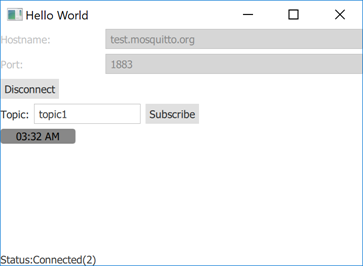Quick MQTT Example
Registering QMqttClient to QML and using it in a Qt Quick user interface.

Quick MQTT demonstrates how to register QMqttClient as a QML type and use it in a Qt Quick application.
Qt MQTT does not provide a QML API in its current version. However, you can make the C++ classes of the module available to QML.
Creating a Client
We create a QmlMqttClient class with the QMqttClient class as a base class:
QmlMqttClient::QmlMqttClient(QObject *parent) : QMqttClient(parent) { }
We use the subscribe() function to create a subscription object:
QmlMqttSubscription* QmlMqttClient::subscribe(const QString &topic) { auto sub = QMqttClient::subscribe(topic, 0); auto result = new QmlMqttSubscription(sub, this); return result; }
We connect to QMqttSubscription::messageReceived( ) to receive all messages sent to the broker:
QmlMqttSubscription::QmlMqttSubscription(QMqttSubscription *s, QmlMqttClient *c) : sub(s) , client(c) { connect(sub, &QMqttSubscription::messageReceived, this, &QmlMqttSubscription::handleMessage); m_topic = sub->topic(); }
We use an QMqttMessage object to store the payload of a received message:
void QmlMqttSubscription::handleMessage(const QMqttMessage &qmsg) { emit messageReceived(qmsg.payload()); }
Registering Classes in QML
In the main.cpp file, we register the QmlMqttClient class as a QML type, MqttClient:
int main(int argc, char *argv[]) { QGuiApplication app(argc, argv); QQmlApplicationEngine engine; qmlRegisterType<QmlMqttClient>("MqttClient", 1, 0, "MqttClient");
In addition, we register the QmlMqttSubscription class as an uncreatable type:
qmlRegisterUncreatableType<QmlMqttSubscription>("MqttClient", 1, 0, "MqttSubscription", QLatin1String("Subscriptions are read-only"));
We can now use the MqttClient type in the main.qml file to create an MQTT client:
MqttClient {
id: client
hostname: hostnameField.text
port: portField.text
}
Files: